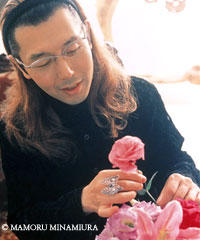 TAKAMATSU, Japan -- A rose by any other name is still a rose, but in the hands of Shogo Kariyazaki -- the celebrity florist who has bloomed into one of Japan's richest men -- a rose is as good as gold.
TAKAMATSU, Japan -- A rose by any other name is still a rose, but in the hands of Shogo Kariyazaki -- the celebrity florist who has bloomed into one of Japan's richest men -- a rose is as good as gold.One part Liberace, one part Martha Stewart, Japan's gender-blending home guru was greeted this week by a standing-room-only crowd in this sleepy western town. With glossy lips, flowing bleached-blond hair and a black silk shirt embroidered with birds of paradise in flight, the slight 46-year-old exclaimed, "Beauty is the essential thing in life!" He then tossed yellow roses and pansies into a vase as his audience offered enthusiastic "oohs" and "aahs."
An estimated 20,000 locals -- one in every 15 residents of Takamatsu -- paid $5 each to view his "fantasy forest exhibition" of day-glo trees and heart-shaped anthuriums at the city's largest department store. Kariyazaki is so popular through his TV appearances, live shows and corporate sponsorships that he ranked as one of the country's biggest individual taxpayers last year, earning 10 times the average salary of Toyota's top executives, according to Japan's National Tax Agency.
Kariyazaki's fame mirrors rapidly changing norms in the land of the samurai. Gender roles have been undergoing a redefinition in recent years as women enter the workforce as never before and men embrace less confining views of masculinity.
The so-called feminization of Japanese men has become a topic of TV talk shows, magazine articles, academic research, films and, perhaps most notably, public acceptance. When Prime Minister Junichiro Koizumi, a divorced father of three, requested a dance with Richard Gere during a meeting this year, no one blinked an eye -- even when Koizumi had Gere lead their waltz.
"There's no question that men are changing the way they think of themselves in Japan. Even salarymen are interested in beauty and looking their best -- either for their girlfriends or just for themselves," said Kariyazaki, referring to the country's male office workers. "It doesn't matter if they are straight or gay. We are simply not afraid to show our feminine sides anymore."
Openly gay entertainers such as Kariyazaki have achieved mainstream success even as heterosexual actors have sought to cultivate an image of gentle manhood.
The shift is in part a product of changing fashion. The market for male aesthetics has grown fourfold in the past seven years to $400 million annually, including day spas for slimming treatments, facials, manicures and painful sessions of eyebrow plucking. The largest such chain -- Dandy House -- has doubled in size since 2000, with 60 locations across the country.
On busy Tokyo subways these days, it is not unusual to see men fishing for packs of Virginia Slims cigarettes in European-style male purses. They have many models to choose from at Isetan Men's -- the successful 10-story department store in chic west Tokyo that opened two years ago and is now the cathedral of masculine vanity.

A poll by Shiseido, the Tokyo-based cosmetics giant, found that more than half of Japanese men in their twenties and thirties said it was important to be "gentle" while only a third said the same of being "intelligent." Perhaps most inexplicably, male thugs in the yakuza -- or Japanese mafia -- are now known to wear pink women's sandals and floral-patterned shirts while prowling the streets late at night.
Kariyazaki, the celebrity florist, credits the changing definitions of masculinity for national acceptance of him and a number of other openly gay performers. Unlike in the United States, where gay entertainers still have problems receiving endorsements from large companies, Kariyazaki is a spokesman for some of Japan's platinum brand names, including All Nippon Airways and Mitsukoshi department stores.
"We have become more sophisticated about how we define masculinity," Kariyazaki said.
"Mr. Kariyazaki is amazing. You can see the power of masculinity in his work, but also the delicacy of his feminine side," said Yoshifumi Sasaki, 53, a construction company owner with a salt-and-pepper bouffant and a clutch handbag who attended the exhibition with his 47-year-old wife. "I think it's wonderful. The best of both worlds."
from WashingtonPost.com
No comments:
Post a Comment